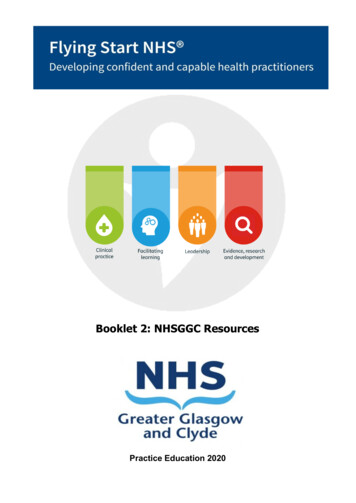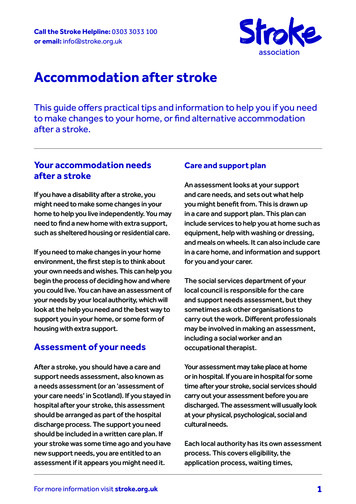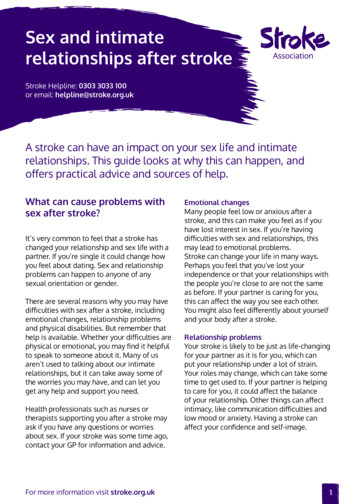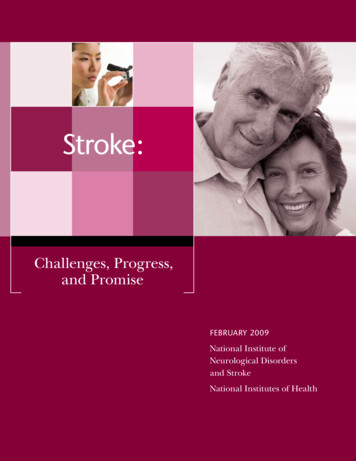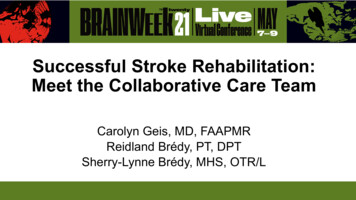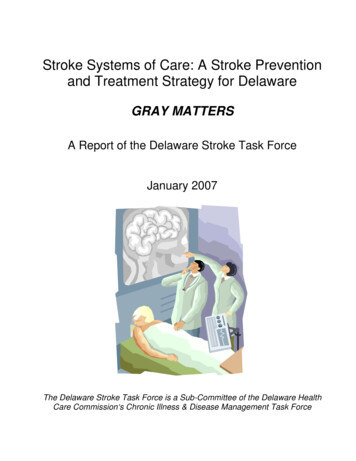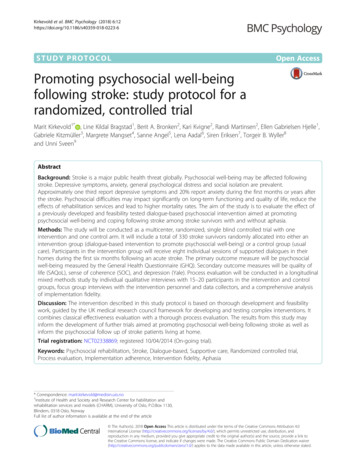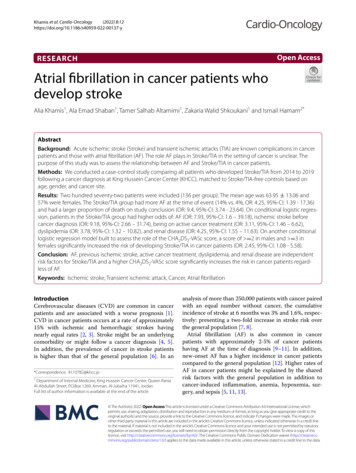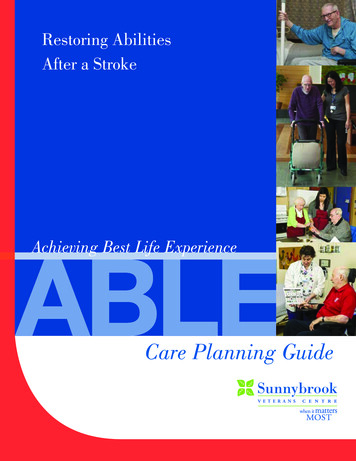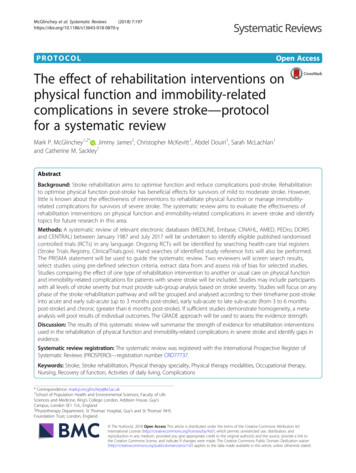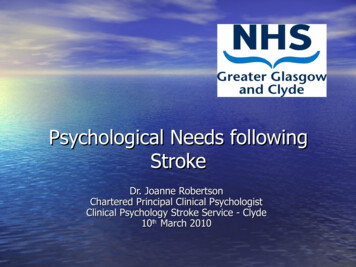
Transcription
Psychological Needs followingStrokeDr. Joanne RobertsonChartered Principal Clinical PsychologistClinical Psychology Stroke Service - Clyde10th March 2010
Overview The psychological consequences of strokeare clinical psychologists included in stroke rehab teams and what are Whytheir roles? Assessment and Formulation of post-stroke emotional difficulties Psychological therapy for post stroke difficulties Neuropsychological assessment and cognitive rehabilitation How to refer to the Stroke Psychology service
The PsychologicalConsequences of Stroke Adjustment Anxiety, anger, sadness normal ‘healthy’ distress (grief reaction) De Ridder et al (2008)Promote adjustment by:- Acknowledging (negative)emotions- Self management, to increasecontrol- Remain as active as possible- Find positive meaning
The PsychologicalConsequences of Stroke Adjustment cont – We typically tell patients it may take 6-24 months to adjustemotionally to their stroke– Advising patients of this can be beneficial– However Some patients may struggle with adjustment to themany changes following stroke, leading to ‘clinically significant’emotional or behavioural problems (DCP, 2008). Depression & Anxiety– Around 1/3 of patients are depressed post stroke (Hackett et al,2005)– Mood disorders have been found to impede patient progress inrehabilitation (e.g. Paolucci et al, 1999)– Around 1/4 of stroke patients may also suffer moderate to
The PsychologicalConsequences of Stroke Cognitive Impairment– Approx 35% of patients are cognitively impaired post stroke (Tatemichi etal, 1994)– Impairments may affect attention, memory, language, movement,perception, disinhibition, emotionalism, executive functioning, insight etc.– Cognitive impairment can impact on functional recovery (Robertson et al,1997, Patel et al, 2003) and create additional challenges for staff andfamilies. Family Functioning– Families must adjust too e.g. adoptionof caring role, changing relationships,sexual problems, financial pressuresetc. These changes can cause significantstress.
The PsychologicalConsequences of Stroke Sleep Problems– Around 20% of patients maysuffer insomnia due to theirstroke (Leppavuori et al, 2000)– Insomnia is a common comorbidsymptom of depression or anxiety– Maintaining factors may be neurological orpsychological i.e. behavioural, cognitive.
Why are clinical psychologistsincluded in stroke rehabteams? National Clinical Guideline for Stroke (2008) & SIGN 64Guidelines recommend that stroke teams should include aclinical psychologist. Clinical psychologists have skills complementary to othermembers of the rehab team. Clinical psychologists are specially trained in assessment,formulation and treatment of psychological difficulties,including specialist neuropsychological assessment andmanagement of cognitive impairment.
Where do we ityStroke Teams
Roles of Clinical Psychologists inStroke Teams Direct Patient Contact- Assessment, formulation and management of psychologicaldisorders post-stroke including depression, anxiety, self-esteemissues and adjustment difficulties- Assessment, formulation, management and cognitive rehabilitationof post-stroke impairment- Assessment and management of behavioural problems post-stroke Indirect Patient Contact-Assessment of carer strain on patients post-strokeWorking with carers as co-therapistConsultation and advice to MDT / external care providers Teaching/training & research
Assessment and Formulation of PostStroke Psychological Difficulties Assessment– May include one-to-one interview(s), standardised questionnaires,discussions with carers and MDT staff, review of medical notes andpossible observation of functioning.– As post stroke impairment varies markedly from person to person,a careful, individualised assessment is required. Formulation– Hypothesis based approach. Possible causes and maintaininginfluences are put forward.– This hypothesis guides choice of intervention strategies. Patientresponse is evaluated and formulation is re-visited and revised ifnecessary.– ‘Scientist-practitioner’ model
Assessment of post strokepsychological functioningFamily/socialsupportBrain pathologyStroke, head injury, etcCognitiveImpairmente.g. MemoryPerceptionLanguageAttentionExecutivePre -morbidfactorse.g coping styleAffectInsighte.g. e.g. HemiplegiaSensory lossDysarthriaPainLossFunctional consequencese.g. WorkADLLeisureDriving
Example of formulationframework: The 4 P’sPredisposingPrevious psychiatric history, personality (e.g. pessimistic)PrecipitatingStroke, other Life events, health problemsPerpetuatingHopeless, angry, negative thoughtsSense of “inadequacy”Inactivity, social withdrawalDysfunctional beliefs about strokePoor sleepProtectiveFamily, relationship, other social networks
Psychological Therapy forMood Disorders after Strokeagreement that early recognition and active management of Widespreadpost-stroke depression is a necessary part of rehabilitation e.g. SIGN 64. Growing evidence base in stroke psychology.
Psychological Therapy forMood Disorders after Stroke Kneebone and Dunmore (2000)– Noted lack of stroke specific efficacy studies buthighlighted effectiveness of Cognitive Behaviour Therapy(CBT) in treating depression in: general adult populationolder adult population (with appropriate modifications)others with neurological conditions. CBT also found to be an effective intervention forpatients with other comorbid mental health andphysical health problems e.g. cancer, pain, heartdisease (e.g. Moorey et al, 1994).
Psychological Therapy for MoodDisorders after Stroke CBT is:Collaborative i.e. based on shared formulation of problemsGoal drivenProblem focused i.e. what strategies can be put in place to altermaintaining factors?– Relatively brief––– Behavioural components e.g. anxiety management,graded exposure, behavioural activation etc. Cognitive components e.g. normalisation, challengingnegative thoughts, cognitive restructuring etc.
Psychological Therapy for MoodDisorders after Stroke Therapy often seeks to improve patients’ understanding of therelationships between thoughts, emotions, physical symptoms andbehaviour e.g.
Neuropsychological Assessmentand Cognitive Rehabilitation Seeks to measure the extent and nature of cognitive deficitsusing standardised, psychometrically valid instruments andcan monitor change in cognitive functioning. Can help to identify the types of difficulties an individual willencounter in day-to-day life and in rehab.- Process includes:Interview with client and carer, informed consent, completion of cognitivescreen(e.g. ACE-R), tailored neuropsychassessmentexamining areas of cognitivedeficit in depth, feedback to client, familyand team where appropriate.
Neuropsychological Assessmentand Cognitive Rehabilitation Cognitive Rehabilitation– Restoration of lost function vs. compensatory rehabilitation.Overall aim is to improve functioning and patient quality of life.– Evidence for effectiveness of cognitive rehabilitation specifically instroke is limited.– Recent systematic reviews of cognitive rehab in broader contextof Acquired Brain Injury (including stroke and TBI) indicatefurther research required.
Case Example 63 year old man Recently retired, previously active, treasurer of localbowling club Stroke in Morrison’s café in Easterhouse Right sided weakness Poor memory to new verbal information and slowedspeed of processing Word finding problems / intact comprehension Low mood and motivation (HADS Depression 16) Highly anxious in social situations (HADS Anxiety13) Highly irritable with wife – slapped on 2 occasions
Case Example Cntd Formulation- Anxiety associated with fear of repeat stroke and belief that otherswould think him stupid because of his poor memory and speech- High level of irritability directed at wife because she tended tospeak quickly and interrupt and speak for him.- Low mood associated with loss of role, hobbies and poor memory- Poor memory for conversation contributed to social anxiety- Wife reporting difficulty coping generally and with husband inhouse all day- Not complying with physio exercise programme due to low mood
Case Example - Goals1. To feel less anxious by gradually increasing the amount of2.(c)(d)(e)(f)3.(a)(b)time spent outdoors, in particular in supermarket and Fortshopping centreTo get round poor memory byAsking people to slow down when they are talking to meWriting important points down in my diaryWriting the things I need to do in the “to do” section ofmy diary as soon as I think of themLooking at my diary over breakfast every dayTo feel less irritated by my wife by:“reminding” her not to interrupt or speak for meTelling her how I am feeling (don’t bottle up)
Case Example Goals4. To feel less depressed by:(a) Going to Stroke Group and the drop in atFernan Street Resource Centre twice aweek(b)Going back to bowling club committee asan ordinary member5. To improve my arm and leg strengths bypractising my exercises twice a day(before breakfast and bed)
Case Example Outcome Able to shop at Morrison’s with his wife without anxiety (HADS Anxiety 6)Forgetting fewer important tasks – using diary togood effectFeeling less depressed (HADS Depression 10)Carer reporting feeling more aware of jumping in /fewer arguments over last month – no furtherslappingRegularly practising exercises and pleased atimproved strength in arm and leg.
How to Refer to StrokePsychology?Referral FormAc ute /Re ha b iAsk patient for consent before referringto psychology. Complete referral form and post / fax / e-mailor Refer directly when psychologist at MDTor Contact by phonePatiIdentifying Information If in doubt about whether a referral isappropriate, please just ask Dr. Joanne Robertson0141 314 689307917 552 495Joanne.Robertson2@nhs.net
References Astrom, M. Generalised Anxiety Disorder in Stroke Patients. Stroke 1996; 27:270-275 Barker-Collo, S. Depression and anxiety three months post-stroke: Prevalence and correlates. Archives of Clinical Neuropsychology 2007; 22(4):519-531Division of Neuropsychology & Division of Clinical Psychology. Briefing Paper:Psychological services for stroke survivors and their families. British Pschology Society,2008D. de Ridder et al. Psychological adjustment to chronic diseaseThe Lancet; 372(9634):246-255Hackett et al. Frequency of depression after stroke: A systematic review of observationalstudies. Stroke. 2005;36:1330-1340Kneebone I. & Dunmore E. Psychological management of post-stroke depression. Br J ClinPsychol. 2000; 39: 53–66Leppävuoria, et al. Insomnia in Ischemic Stroke Patients. Cerebrovasc Dis 2002;14:90-97Moorey, S. & Greer, S. Cognitive Behaviour Therapy for People with Cancer. Oxford;Oxford University Press, 2002Paolucci S, et al. Poststroke depression and its role in rehabilitation of inpatients. ArchPhys Med Rehabil, 1999; 80:985–90.Patel, M., et al. Natural history of cognitive impairment after stroke and factors associatedwith its recovery. Clinical Rehabilitation 2003; 17(2):158-166Robertson, I.H et al. Motor recovery after stroke depends on intact sustained attention: A2-year follow-up study. Neuropsychology. 1997; 11(2):290-295.National Clinical Guidelines for Stroke (3rd Edition). Psychology concise guide for stroke,2008Scottish Intercollegiate Guidelines Network. 64: Management of patients with stroke.SIGN; Edinburgh, 2002.Tatemichi, T.K. Cognitive impairment after stroke: frequency, patterns, and relationship
Why are clinical psychologists included in stroke rehab teams? National Clinical Guideline for Stroke (2008) & SIGN 64 Guidelines recommend that stroke teams should include a clinical psychologist. Clinical psychologists have skills complementary to other members of the rehab team. Clinical psychologists are specially trained in .
